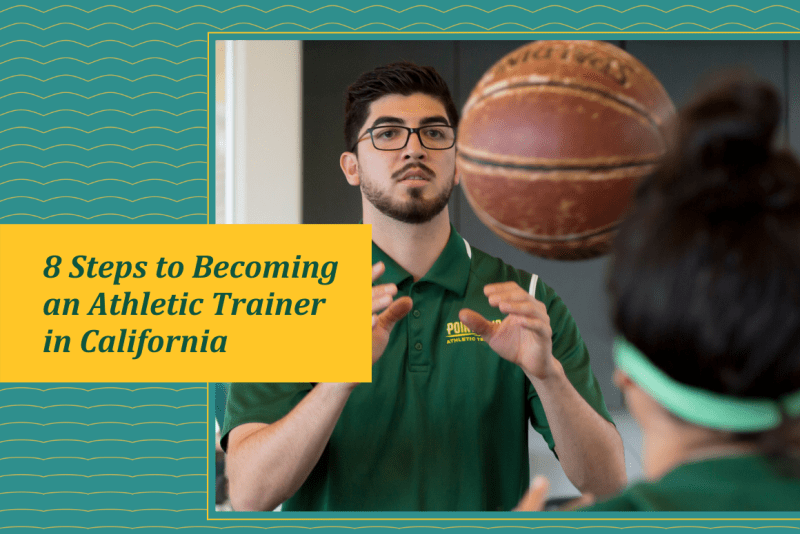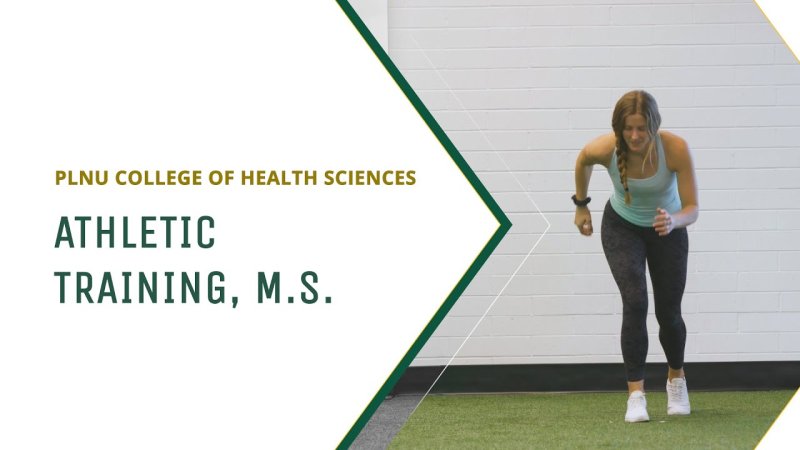
Becoming an athletic trainer in California is a rewarding journey that requires dedication, education, and certification. Athletic trainers play a crucial role in the healthcare system, providing essential services to athletes and active individuals.
This comprehensive guide outlines eight steps you need to take to embark on this fulfilling career path.
Step 1: Understand the Role of an Athletic Trainer
First and foremost, it's crucial to have a clear understanding of what an athletic trainer does. Although athletic trainers work with athletes to improve their health and performance, they are also healthcare professionals who specialize in the prevention, assessment, treatment, and rehabilitation of injuries and illnesses related to physical activity.
Athletic trainers work in numerous settings, including schools, fitness facilities, rehabilitation centers, and sports programs including professional sports teams. Meet some of PLNU’s very own Athletic Trainers.
Step 2: Obtain a Bachelor's Degree
The second step towards becoming an athletic trainer in California is obtaining a degree from an accredited institution, like PLNU. While some states may accept related majors, pursuing a degree in athletic training or a closely related field can give you the best education and experience.
Now, what are the certification requirements? Again, to meet the requirements set by the California Board of Certification (BOC), aspiring athletic trainers must graduate from an accredited Athletic Training Education Program (ATEP). Why? These programs provide the necessary coursework and clinical experiences needed to excel in the athletic training field.
Step 3: Gain Hands-On Experience through Clinical Education
A vital aspect of your athletic training education involves hands-on clinical experiences. For PLNU graduate student Kaela Knight, this hands-on experience looked like clinical hours at a division-one university, where she had the opportunity to work with student-athletes to help prevent, diagnose, and treat injuries.
Knight also gained experience providing on-field coverage during practices and games for injured athletes as well as clinical experience on industrial sites and in urgent care facilities. Read on to learn more about PLNU’s hands-on Athletic Training experience and how it prepares you for a hands-on career.
During your accredited program, you will work under the supervision of a certified athletic trainer to gain practical skills in injury assessment, prevention, and treatment. Clinical education is crucial in preparing you for the challenges of the profession.
Interested in learning what a day in the life of Athletic Training looks like? Read our article “A Day in the Life of a PLNU Athletic Training Graduate Student” for more insight.
Step 4: Acquire Certification
After completing your education, it's time to become a certified athletic trainer. This is achieved by passing the BOC exam. The BOC exam assesses your knowledge and skills in areas such as:
- Injury prevention
- Clinical evaluation
- Immediate care, treatment, and rehabilitation
Passing this exam demonstrates your proficiency and readiness to practice as an athletic trainer.
Step 5: State Licensure in California
In California, athletic trainers are required to obtain state licensure through the California Board of Athletic Training. This involves submitting official transcripts, proof of BOC certification, and any additional documents required by the board. During this step, be sure to review the specific requirements and application process outlined by the board.
Curious if your athletic training licensure is valid outside of the state you live in? Please be sure to check licensure requirements for your specific state.
______
Who are you called to be?
Pursue your purpose at PLNU.
______
Step 6: Network and Gain Experience
Building a professional network is invaluable for any career—and athletic training is no exception. Engage with local athletic trainers, sports teams, and healthcare professionals to expand your knowledge and opportunities.
Remember, athletic trainers are everywhere:
- Local gyms
- Hospitals
- High schools
- Colleges and universities
- Rehabilitation centers
At the beginning of your career journey as an athletic trainer, take advantage of all these networking locations. Be sure to research your local, state, and national athletic training organizations for opportunities. Lastly, consider volunteering or interning with organizations to gain valuable experience and showcase your skills.
Step 7: Maintain Continuing Education
Congratulations—you’re officially an athletic trainer! However, the journey has just begun. Continuing education is crucial for staying current with the latest advancements in the field of athletic training.
The California Board of Athletic Training mandates ongoing education to ensure that athletic trainers provide the highest level of care. This may involve attending periodic workshops and seminars or obtaining advanced certifications.
Step 8: Consider Advanced Certifications and Degrees
While not mandatory, obtaining advanced certifications can enhance your career prospects and allow you to specialize in certain areas of athletic training, such as:
- Sports Nutrition
- Strength and conditioning
- Manual therapy techniques
PLNU offers a Master of Science in Athletic Training (MS-AT). Our program offers state-of-the-art athletic training, human performance, and biomechanics labs at our Balboa Regional Center. Industry-experienced faculty and connections with professional sports teams ensure that students receive top-tier competitive education in the athletics field. We also offer a B.A. in Health and Human Performance, which is a perfect undergraduate precursor to the MS-AT.
While taking classes in anatomy, physiology, kinesiology, and exercise physiology are essential components of understanding how to help people train and take care of their bodies, graduate degrees can also be a requirement for hire—and can help set applicants apart from the competition.
How PLNU Can Help You Reach Your Athletic Training Goals
Embarking on the journey to become an athletic trainer in California is a rewarding endeavor that requires dedication, education, and certification. Luckily, PLNU offers a first-class program for aspiring athletic trainers.
With a blend of theory and hands-on experience, students gain comprehensive skills in their time by the sea. With cutting-edge facilities, experienced faculty, and opportunities for practical application, our dynamic environment prepares students to excel in the competitive field of athletic training. Learn more about our Kinesiology department and PLNU’s application process today.
